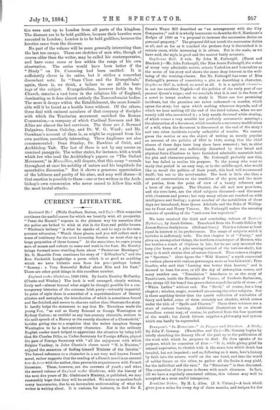England tinder Gladstone, 1880-1884. By Justin Huntley McCarthy. (Chatto and
Windus.) The book is well arranged, clearly written, lively and—almost beyond what might be thought possible for a con- temporary historian of the extreme Irish party—tolerably impartial. In point of style there is somewhat of a superabundance of literary allusion and metaphor, the introduction of which is sometimes forced and far-fetched, and seems to obscure rather than illustrate the story. It hardly helps the statement to say that Mr. Trevelyan made the young Fox, "as real as Harry Esmond or George Warrington or Sydney Carton ; as truthful as any last-century chronicle, written in the acid speech of a Harvey or the courtly slanders of a Chesterfield," besides giving rise to a suspicion that the writer imagines George Warrington to be a last-century character. Nor is the ordinary English reader much helped to appreciate the situation by being told that Sir Charles Dilke, as Under-Secretary for Foreign Affairs, played the part of Foreign Secretary with "all the enjoyment with which Salpice Vandrey, in Jules Clautiu's clever novel " M. is Ministre," enjoyed the sensation of finding himself Minister of the Interior." The forced reference to a character in a not very well known French novel, rather suggests that the reading of a French novel is an unusual tour de force with the author, than proves his acquaintance with French literature. These, however, are the excesses of youth ; and when the second volume of England under Gladstone, with the history of the next five years of Mr. Gladstone's Ministry, is published, we may reasonably hope that they will be avoided. We notice as another fault many inaccuracies, due to an incomplete understanding of what the writer is writing about. It is carious, for instance, to find Sir R.
Cross's Water Bill described as " an arrangement with the City Companies ;" and it is wholly inaccurate to describe Sir S. Northcote's Budget of 1880 as "a proposal to increase the succession duties on personal property." The proposal did not touch the succession duties at all, and so far as it touched the probate duty it diminished it in certain cases, while increasing it in others. But in the main, as we have said, the style is good and the matter fairly accurate.


































 Previous page
Previous page